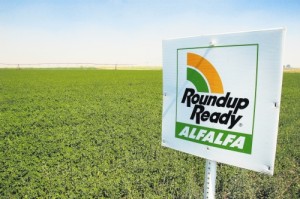Biotech industry staves off further regulation of GE alfalfa

A U.S. District judge has upheld an Agriculture Department decision that allows farmers to plant Monsanto Co.'s Roundup Ready alfalfa, a genetically engineered alfalfa made to withstand Monsanto's Roundup herbicide. The court action is the latest in a series of controversial rulings that have intensified the debate over the proper role of patent law in regards to living organisms.
In last Thursday's ruling, federal Judge Samuel Conti of San Francisco rejected arguments from a group of alfalfa farmers who wanted regulators to impose buffer zones to prevent what they allege is a high likelihood of their fields being contaminated by GE pollen conveyed by wind and bees. Conti wrote in his decision that the department acted appropriately in assessing the risks posed by the new crop because federal law does not require regulators to "account for the effects of cross-pollination on other commercial crops".
The USDA initially approved the use of Roundup Ready alfalfa in 2005, but another judge banned the planting of the crop in March 2007, ruling that more environmental impact studies were needed to evaluate the safety and to assess the possible environmental threat of “genetic out-crossing” to neighboring conventional or organically grown plants. In January of 2011, Roundup Ready alfalfa was allowed back on the market after the USDA's Animal and Plant Health Inspection Service declared a “possible but unlikely” chance that Roundup Ready alfalfa pollen could contaminate conventional crops. In weighing this evidence, Conti ruled that Roundup Ready alfalfa is not more hazardous than other varieties and that the department correctly concluded that it lacked the authority to single out GE alfalfa from its non-patented counterparts.
About 1 million of the roughly 20 million acres of alfalfa planted in the United States are found in California. Alfalfa is the nation's fourth-largest crop, making it pivotal to the nation's food system. It is used mainly for hay and feed for the cattle industry.
The San Francisco-based nonprofit Center for Food Safety (CFS) is representing plaintiffs in the case. George Kimbrell, an attorney for CFS says the decision will be appealed.



